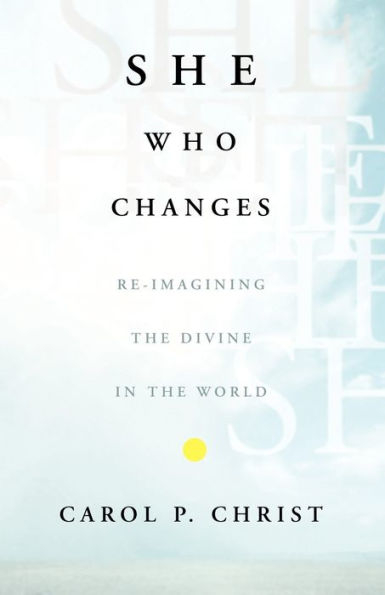Carol Christ's She Who Changes is a simply brilliant Goddess movement theology. Everybody, order a copy, I'll wait here. I’ll warn you that it is a formal theology, not pop theology, so if you don’t have a theological background, you might find it a challenge. It’s also a bit expensive.
Adapting Charles Hartshorne's process philosophy to the needs of a feminist theology, Christ develops a splendid and coherent theology which addresses many of the failings of Patriarchal theologies without simply producing Yahweh in drag (the feeling I get when I struggle through some other feminist theological writing). Hartshorne identifies six common theological mistakes of classic theism: God as perfect and therefore unchangeable, omnipotence, omniscience, God's unsympathetic goodness, immortality as a career after death, and revelation as infallible. (33).
Working carefully through each of these errors and demonstrating process theology's answer to them, Christ develops a portrait of the divine as part of the world, changing as it changes, in the body and the material, based on power-with rather than power-over (her brilliant discussion of human free will and independence is the greatest strength, among several very fine ideas), pleasure and joy as the purpose and meaning of life, and hope not in outcomes but in the process of full engagement in this happening world. Really quite splendid stuff.
I struggled with this book, however, because of her embrace of Hartshorne's notion of 'dual transcendence' which grants Goddess a unchanging character which is infinitely loving and sympathetic and unchanging alongside the rest of Her existence as a part of this changing universe. It feels to me like a dodge to rescue a monotheistic personal deity from what is otherwise a very fine argument. I have personal relationships with deities whom I understand to be dependent, like myself, on the universe, but am not comfortable with the notion of the Source of All being a person.
Another issue that I have is that I do not see how Christ's theology builds community or worship groups. And I have a strong interest in ecclesiology. I do, however, see ways of using her theology in exploring issues that interest me, and understand that we are interested in different problems. I'm not critical of her for not being particularly interested in some of the things I'm interested in. This just limits how useful I'll find her theology.
Let me be agnostic on the personhood of the Great Mother of All, and I will very highly recommend this book. She Who Changes is a really fine work.
~ review by Samuel Wagar
Author: Carol Christ
Palgrave MacMillan, 2004
288 pg. Paperback £45 / $80 Can / $55 US

